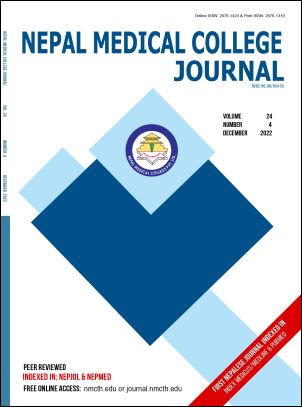Association between Serum Uric Acid and Blood Glucose Level in Diabetic and Non-diabetic Patients
DOI:
https://doi.org/10.3126/nmcj.v24i4.50576Keywords:
Association, blood glucose, diabetes, uric acidAbstract
Uric acid increases insulin resistance; likewise, hyperinsulinemia increases uric acid concentration, and both are global health problems. This study is conducted to find the association between serum uric acid and blood glucose level. This was a cross-sectional study conducted in the Department of Biochemistry and Internal Medicine at Dhulikhel Hospital, Nepal, for a duration of six months (September 2021 - February 2022). A total of 130 diabetic patients who consented were compared with 130 non-diabetics by using non-probability convenient sampling technique. Ethical clearance was taken from the Institutional Review Committee-Kathmandu University School of Medical Sciences. Venous blood was collected and fasting blood glucose, post-prandial blood glucose, and serum uric acid were measured. Data were analyzed in the Statistical Package for Social version 16.0. Analytical data were compared using Mann Whitney U test, and Spearman correlation was performed to correlate numerical parameters. Statistical significance was defined as a two-sided p-value of less than 0.05. The median of serum uric acid level was significantly higher in diabetics than non-diabetics; the level of fasting and post-prandial blood glucose positively correlated with serum uric acid (p<0.05). Hyperuricemia was more in diabetics than non-diabetics (p<0.05). Serum uric acid level increased with the increase in age and duration of diabetes.
Downloads
Downloads
Published
How to Cite
Issue
Section
License
Copyright (c) 2022 Nepal Medical College Journal

This work is licensed under a Creative Commons Attribution 4.0 International License.
This license enables reusers to distribute, remix, adapt, and build upon the material in any medium or format, so long as attribution is given to the creator. The license allows for commercial use.




